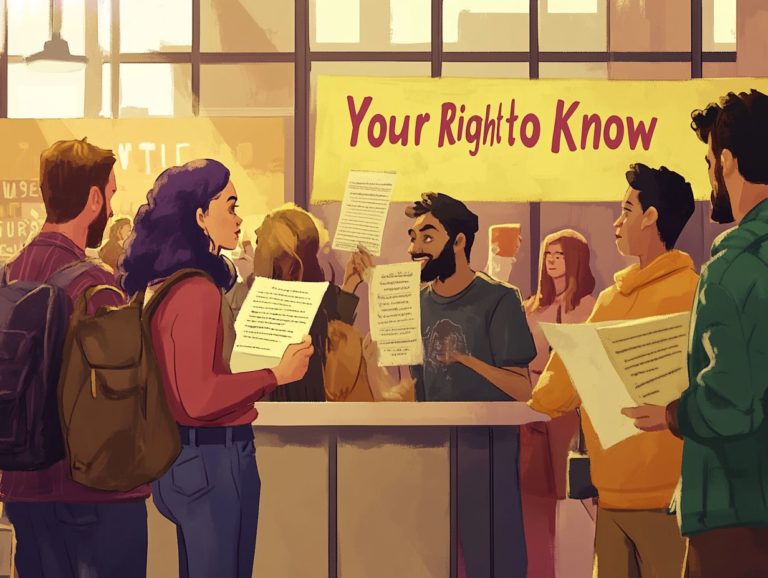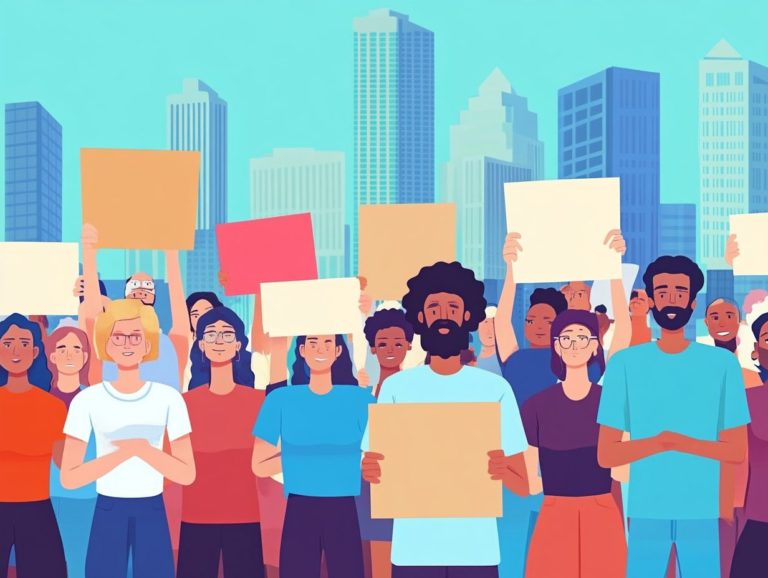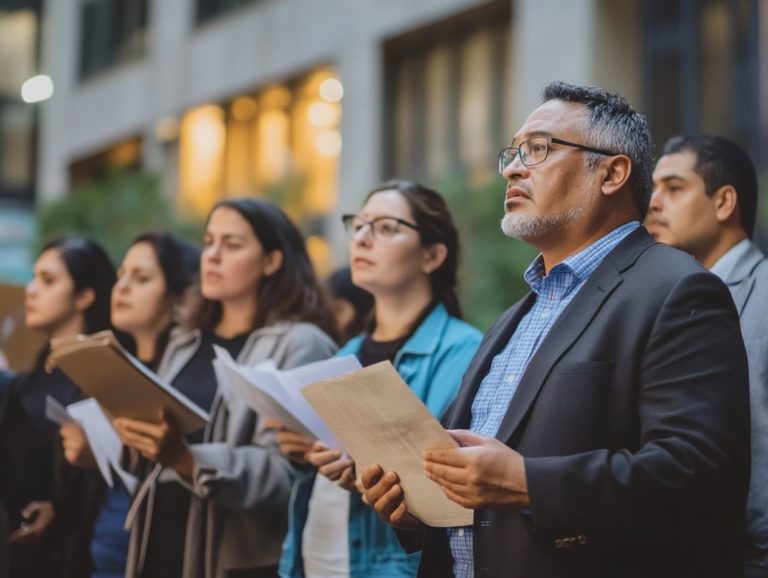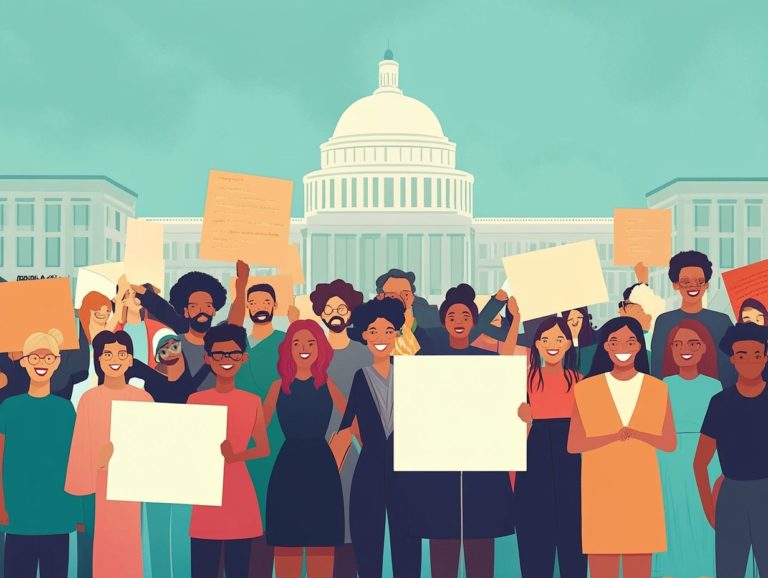Defending Yourself: Your Rights Explained
Navigating legal rights can feel overwhelming, especially during a physical altercation or when dealing with law enforcement. Understanding your protections is key to ensuring your safety.
This article breaks down your rights, covering self-defense and how to interact effectively with police. You’ll learn what to do if you’re charged with a crime and how to assert and protect your rights.
Stay sharp and ready as you explore these crucial topics.
Contents
- Key Takeaways:
- Know Your Rights
- Defending Yourself in Different Situations
- Navigating the Legal System
- Protecting Your Rights
- Staying Safe and Informed
- Frequently Asked Questions
- What are my rights when defending myself?
- Can I defend myself if someone attacks me on the street?
- What should I do if I am arrested for defending myself?
- Are there any situations where defending myself is not allowed?
- Can I use a weapon to defend myself?
- What should I do if I witness someone else being attacked?
Key Takeaways:

- Knowing your legal rights is vital for defending yourself effectively.
- You have the right to protect yourself in any physical altercation or interaction with law enforcement.
- If charged with a crime, act quickly to safeguard your rights and seek legal help.
- Asserting your rights is crucial, and resources are available to keep you informed.
- Understanding your rights helps you maintain your safety and achieve justice.
Know Your Rights
Understanding your rights is essential during complex situations involving self-defense. Self-defense laws vary by location, and it’s important to know how they apply to you.
You must understand the key elements of self-defense, especially scenarios involving provocation and unlawful force. Knowing your legal rights empowers you to defend yourself more effectively.
Understanding Your Legal Rights
Understanding your legal rights helps you navigate self-defense situations. When facing an imminent threat, you have the right to protect yourself using reasonable force.
Affirmative defenses allow you to prove your actions were justified, which can lead to acquittal if demonstrated convincingly. Various cases, such as the trial of George Zimmerman, underscore these rights.
Grasping the differences between proportionality and immediacy in self-defense claims can significantly impact legal outcomes. This understanding is vital for navigating court settings.
Defending Yourself in Different Situations
Defending yourself requires a clear understanding of self-defense laws. These laws are especially relevant in physical altercations and interactions with law enforcement.
The right to self-defense involves using reasonable force against immediate harm. Determining what qualifies as reasonable versus unlawful force can be complex and context-dependent.
Key factors like provocation play a vital role, as does the legal precedent in your area. Knowing when to defend yourself and the legal standards is essential for effective self-defense.
Self-Defense in Physical Altercations
Self-defense in physical altercations hinges on your ability to apply the right amount of force in response to an immediate threat. This principle emphasizes evaluating each situation carefully to determine if your reaction is justified.
Legal standards draw a clear line between reasonable force using just enough physical pressure to deter an aggressor and excessive or unlawful force. The latter can lead to serious legal consequences.
For example, in the case of State v. Hines, the jury had to decide whether the defendant s use of a baseball bat against an unarmed assailant was a reasonable act of self-defense. Provocation plays a pivotal role in these evaluations. If you are the initial aggressor, you may lose your right to claim self-defense.
This nuance is emphasized in Fitzgerald v. State, highlighting the delicate balance you must navigate during such confrontations.
Legal Rights in Interactions with Law Enforcement

Knowing your rights during interactions with law enforcement is essential, especially when self-defense factors into the equation. Understanding your legal rights can greatly affect the outcome of any encounter, particularly if tensions rise.
It s important to recognize that these rights can vary significantly depending on your location. Staying informed is vital. Local laws can often be complicated, so knowing them will help you navigate potentially tense situations with confidence.
Navigating the legal system may seem daunting, but you can tackle it with the right knowledge. This journey requires understanding the complexities involved, ensuring you are well-prepared to protect your rights and make informed decisions.
Steps to Take if Charged with a Crime
If you’re facing criminal charges, especially in a self-defense situation, there are several crucial steps you must take to protect your legal rights.
- First and foremost, securing experienced legal representation is essential. An attorney well-versed in the judicial system will provide invaluable advice and help you craft a strong defense strategy tailored to your case.
- Gathering evidence and witness statements is paramount, as these elements can significantly sway the outcome.
- When invoking self-defense, it s imperative to effectively argue this within the legal framework. You ll need to prove the reasonableness of your perception and the necessity of your response in the moments leading up to the charges. This process requires thorough preparation to ensure your defense is solid.
Finding Legal Representation
Finding the right legal representation is essential for successfully navigating self-defense cases within the complex realm of criminal law. Assess an attorney s experience carefully, particularly in understanding jurisdictional laws governing self-defense claims.
An attorney well-versed in these specifics won t just know the varying laws across different regions; they will also have the skills to construct a robust legal defense tailored to your case.
This choice is increasingly significant, as the quality of representation can profoundly influence the case s outcome, swaying the jury s perception and affecting the judge s rulings. Selecting an attorney with a proven track record in similar cases can be a crucial factor in achieving a favorable resolution.
Protecting Your Rights
Protecting your rights is essential in any legal encounter, especially in self-defense situations that come with many legal complexities.
Tips for Asserting Your Rights

Asserting your rights effectively, particularly in self-defense situations, demands a solid grasp of the legal issues at play.
Navigating these intricate laws may feel overwhelming, but remember that your moral authority is pivotal in justifying your actions. It’s vital not only to comprehend the law but also to explain why you made each decision during a stressful situation.
Document events consistently. Use a journal or eyewitness accounts to strengthen your case. Keeping open lines of communication with your legal advisors will offer clarity and support, enabling you to adopt a more prepared approach should any claims arise from the situation.
Staying Safe and Informed
Staying safe and informed is crucial for anyone looking to navigate the intricacies of self-defense laws.
Understanding these complexities gives you the power to make informed decisions and ensures that you are well-equipped to protect yourself effectively.
Resources for Understanding and Protecting Your Rights
Many resources are available to help you understand and protect your rights in self-defense situations.
From legal aid organizations offering free consultations to educational materials like pamphlets and online guides, the information you need is readily accessible.
Join exciting community workshops where you can learn and ask experts your questions!
Support groups create a space for discussions with peers who share similar concerns, fostering a sense of empowerment and knowledge.
By exploring these avenues, you ll not only feel more prepared but also gain the confidence to navigate the complex legal landscape surrounding self-defense.
Frequently Asked Questions
1.
What are my rights when defending myself?
When defending yourself, you have the right to use reasonable force to protect yourself or others from harm. This includes physical force, but it must be proportionate to the threat you are facing.
2.
Can I defend myself if someone attacks me on the street?

Yes, you have the right to defend yourself if you are being attacked or feel like you are in danger. However, you must use only as much force as necessary to protect yourself and try to escape the situation if possible.
3.
What should I do if I am arrested for defending myself?
If you are arrested for defending yourself, do not resist arrest. Stay calm and cooperate with the authorities. You have the right to remain silent and seek legal representation, so avoid making any statements until you have spoken with a lawyer.
4.
Are there any situations where defending myself is not allowed?
Yes, there are certain situations where defending yourself is not allowed. For example, if you started the altercation or if the level of force you used was excessive, you may not be able to claim self-defense. It is best to seek legal advice if you are unsure.
5.
Can I use a weapon to defend myself?
It is legal to use a weapon for self-defense in certain circumstances, such as if you are facing a deadly threat. However, you must have a valid permit for the weapon and use it only as a last resort. You may still face legal consequences if the use of the weapon is deemed excessive or unwarranted.
6.
What should I do if I witness someone else being attacked?
If you witness someone else being attacked, you can intervene to defend them if you believe it is necessary. However, you should also call for help from the authorities as soon as possible. It is important to prioritize your own safety and avoid using excessive force.
Stay informed and empowered protect your rights today!






